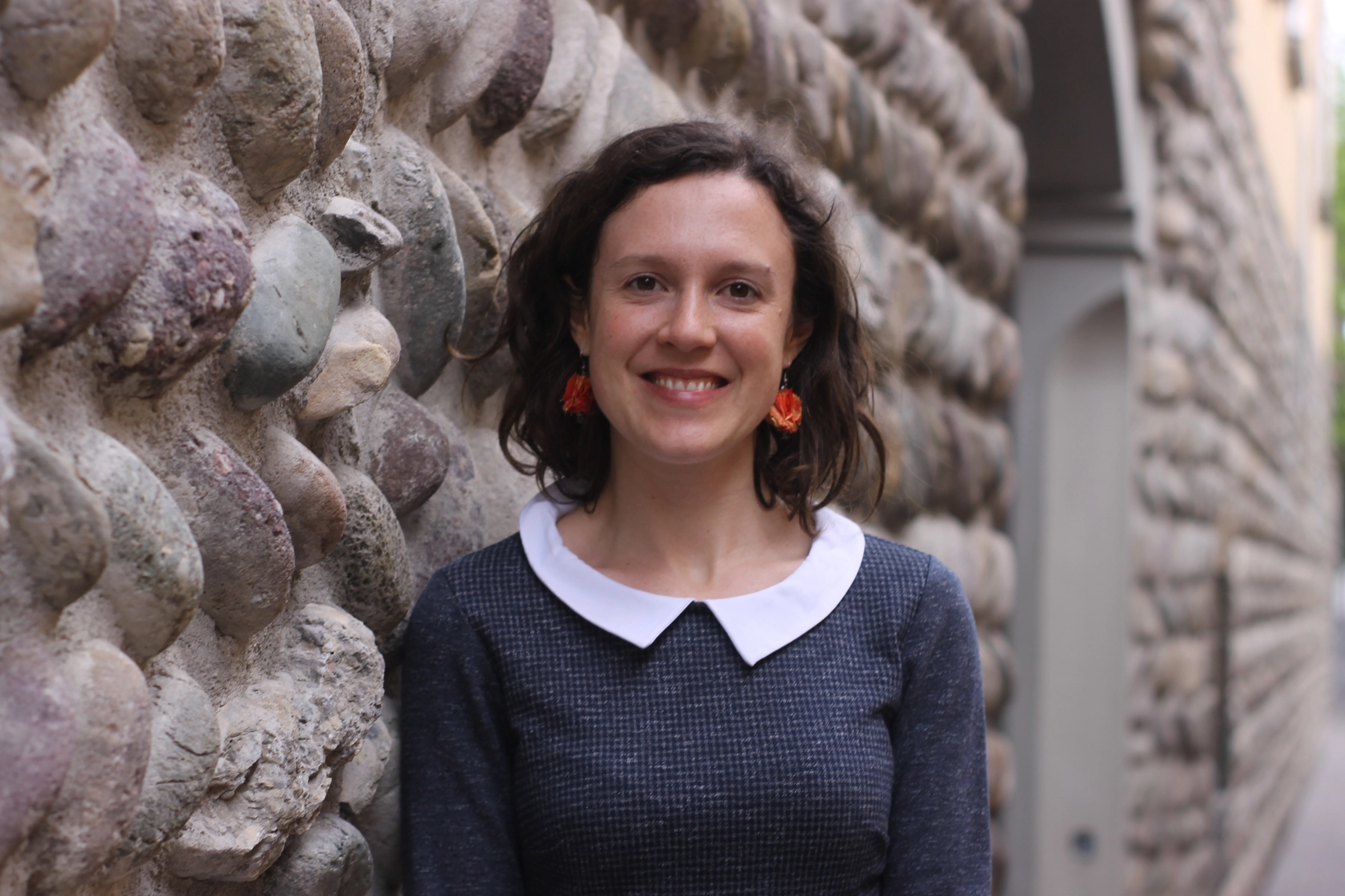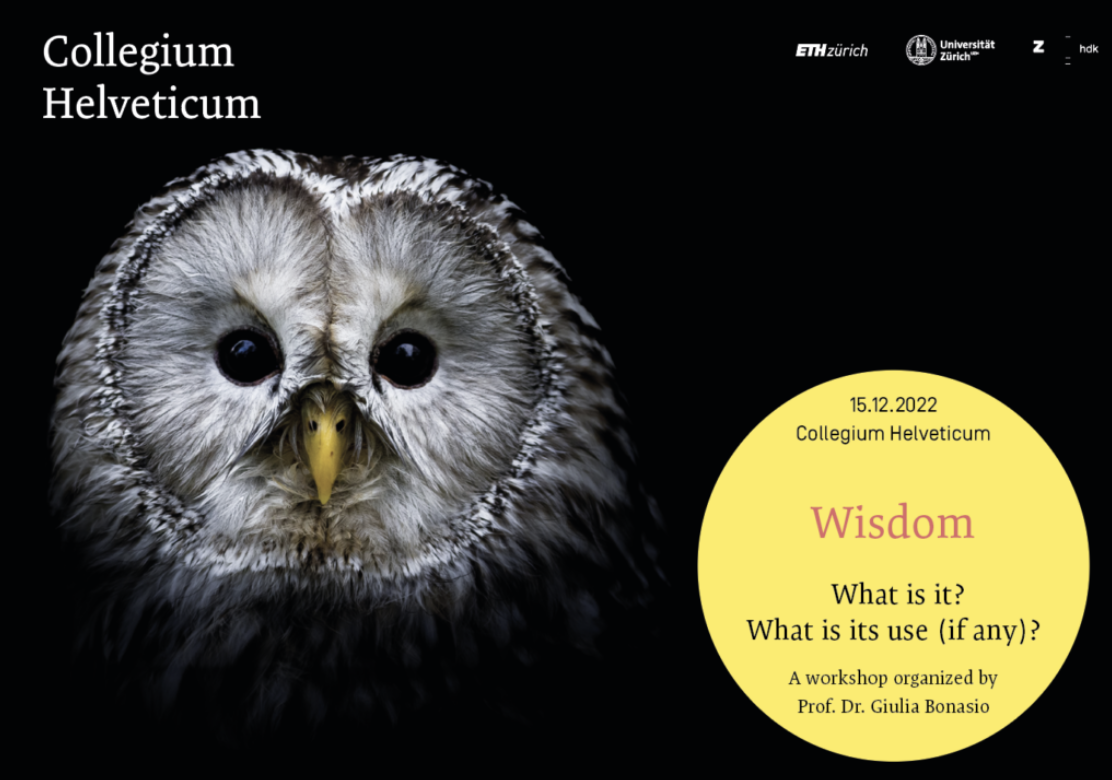From September to December, I have been ZAZH Gastprofessur (Junior). Without doubts, I can say that this period as ZAZH Gastprofessur has been one of the most enjoyable and intellectually stimulating. As member of the ZAZH – Center for the Study of the Ancient World, I was located in the beautiful building of the Seminar für Griechische und Lateinische Philologie (SGLP) at the University of Zürich. At the same time, I was also a Senior Fellow at the Collegium Helveticum. I felt very honoured to be part of the ZAZH: when I received the invitation, I had been in Durham for not even a year and I was not sure whether I was ready to move to another place, even for a short period of time. Now, after four months in Zürich, I am extremely glad that I accepted the invitation. These months have been not only very productive for my research, but I had occasions to present my research to a wider audience and to build collaborations with colleagues in ancient studies as well as in other fields. I shared the commitment of the ZAZH to make ancient ideas and ancient texts accessible to a broader audience and to foster an inclusive approach to ancient studies: I witnessed the fundamental work that the ZAZH is doing in Zürich in academia as well as for high-school students and for the general public to make ancient texts and ideas available to everyone. I think that ancient studies are a resource that can help us understand ourselves and human relations in a better way, and we have a duty to offer this experience to as many people as possible. As part of the ZAZH, I engaged in many outreach activities such as a public lecture and a lecture to high-school students.
ZAZH lecture
On September 28, I gave a public lecture on “Aristotle’s good life and European identities” in the context of the ZAZH annual theme. I discussed the role of the virtues or excellences in Aristotle’s ethics. The virtues of character and the virtues of thinking are at the core of Aristotle’s ethics. They have shaped the narratives of identities proposed by philosophers, intellectuals and politicians from late antiquity until now. An approach to Aristotle’s ethics that includes the perspective of the Eudemian Ethics highlights that Aristotle’s framework accommodates several kinds of good lives and it is sensitive to a wide range of values. In the lecture, I discussed the role of Aristotle’s ethical proposal in shaping European identities in particular in relation to ideas on what it means to live a good life on the individual and on the political level. The lecture was well attended and I was pleased to see some of the students that were attending the seminar on Aristotle that I was teaching at the University of Zürich as well as people from the general public. The discussion that followed the lecture was stimulating and it was the perfect occasion to receive feedback on how to present my research to a wider audience. I enjoyed answering to all the questions and continuing the discussion by email and in conversation with some of the participants.
ZAZH seminar
As part of my fellowship, I taught a weekly seminar on “Contemplation and virtue in Aristotle’s ethics and its reception in Europe.” The seminar focused on Aristotle's ethics and epistemology and on the reception in Europe. Special attention was given to understudied Aristotelian texts such as the Eudemian Ethics and the Protrepticus and to the notions of contemplation and virtue. The seminar explored the idea that Aristotle's proposals have been enriched by the encounter with the Islamic tradition and by Aristotle's interpretation by Christian Medieval thinkers. Through discussion and investigation of Aristotle's texts and of Aristotle's reception in Europe, including in contemporary debates, the seminar suggested that Aristotle's legacy and its role in relation to European identities was complex and included elements from different traditions and cultures. The seminar was attended by students from different backgrounds, ranging from philosophy to classics, from literature to Islamic studies. It was an excellent experience insofar as the students were committed and eager to participate. We had interesting discussions and the students showed excellent abilities to understand the material and to elaborate it in personal ways: they had to prepare a short presentation in class and this occasion gave them the chance to receive feedback from their peers and to develop a personal understanding of the texts.
ZAZH lecture to high school students
As part of a “Ferienkurs” in Greek language and culture offered by the ZAZH to students of the local Gymnasium, I gave a lecture on happiness in Aristotle. I explained Aristotle’s idea of happiness which can be translated also as “good life” or “flourishing.” Aristotle’s proposal is ambitious, and it is particularly appealing for young students who are trying to find their way in life. The students were eager to know more and they immediately reacted to my lecture with fundamental questions about how to make important choices in life and how to establish good friendships and be good citizens. This lecture was an occasion for me to experience once more the ZAZH’s commitment to bring ancient ideas to a wider audience and to offer a powerful tool—the perspective of the ancients—to young people. I learnt how to present philosophical ideas to very young students and I was impressed by their excellent knowledge of English compared to my poor German.
SGLP
As part of my role as ZAZH-Gastprofessorin (Junior), I was collaborating with the SGLP. I felt very welcome: I participated in the Research Seminar where I had a chance to discuss the research projects of PhD students as well as colleagues. I learnt a lot from these projects, and I enjoyed the atmosphere of collegiality. I presented my own research on the virtues of theoretical thinking in Aristotle’s Eudemian Ethics at the Research Seminar on October 31 and I benefitted from a fruitful discussion about philological and philosophical questions. In formal and informal ways, I had a chance to meet colleagues, to benefit from their experience, and to contribute to the intellectual atmosphere of the SGLP. The team of Barbara Holler, Barbara Sigrist, and Fabian Zogg has been extremely helpful from the beginning: I felt at home since my first days in Zürich and they offered me the best conditions to work and to focus on my research. The colleagues at the SGLP, and in particular Christoph Riedweg, Ulrich Eigler, and Carmen Cardelle de Hartmann were always ready and willing to discuss ideas and to share their knowledge. I had interesting discussions with PhD students and postdocs in the Department that made me think about how to connect my research to their research interests. Overall, it was a wonderful experience that allowed me to focus on my work and to establish research collaborations and friendships that I hope that will continue in the future.
Collegium Helveticum
Together with my invitation to the ZAZH, I was awarded a Senior Fellowship at the Collegium Helveticum. My associate fellow at the Collegium was Prof. Dr. Christoph Riedweg. As part of the fellowship, I participated in the weekly seminars where fellows present and discuss their research in an interdisciplinary environment and I presented my book project to the fellows of the Collegium on October 20. For this occasion, I had to think about how to present my research in an interdisciplinary setting: it was a very useful exercise and I benefitted from the interdisciplinary discussion that followed the presentation.
On November 15, I organised an interdisciplinary workshop on “Wisdom: what is it? What is its use (if any)?” Wisdom has been understood in different ways across time and space. Since antiquity, wisdom has been considered the defining trait of the philosopher. Aristotle famously distinguishes between a type of wisdom that is theoretical and that aims at the truth of what is eternal and necessary, and a type of wisdom that is practical and that aims at directing actions and choices. In the Middle Ages, Islamic and Christian philosophers are greatly concerned with contemplation, meditation, and theoretical speculation. All these activities are the mark of the wise. In psychology and moral theory, wisdom is often understood as the search for the good for the individual or for the community. Psychological theories stress that wisdom requires a fine balance between cognitive, emotional and motivational elements. Wisdom is fundamental also at the political level as a powerful tool in collective problem-solving. In light of global challenges where fake news play a dangerous role, engaging in reflective modes of thinking that challenge our assumptions and aim at the truth seems more important than ever. In addition to the ability to deliberate well and to make practical choices, there seems to be the need to develop a type of wisdom that can offer us the key to understand the cosmos and our role in it. But what is this type of thinking that we call wisdom? What is its use (if any)? These are the central questions that we explored in the workshop.
At the workshop, I invited three speakers respectively from the University of Hamburg, the University of Adger and the University of Bruxelles, and colleagues from the University of Zürich and from the ETH. At the end of the workshop, I organised a final panel with speakers in the fields of Islamic philosophy, ancient Greek philosophy, neuroscience and biology. The workshop was well attended and it was a very productive and stimulating occasion. I received overwhelming positive feedback from speakers and participants. They all found the occasion very interesting especially for its unique interdisciplinary character. After the workshop, I was contacted by email by Dr. Serena Pirrotta, editor for Philosophy and Classics at De Gruyter. Dr. Pirrotta wrote to me that De Gruyter is interested in publishing a volume with the papers presented at the workshop. I decided to edit the volume and almost all the speakers agreed to submit their papers. In general, this experience at the Collegium Helveticum has been very productive for my career, and it has been very enjoyable: I am especially grateful for all the discussions with the fellows that allowed me to think about my research in a different way.
Final considerations
These months at the ZAZH have been truly wonderful: I was able to finish my book manuscript on The unity of the virtues in Aristotle’s Eudemian Ethics, which I will send out to Oxford University Press and to Cambridge University Press in the next months. This is an important milestone for my career.
Thanks to the Collegium Helveticum, I started a project on wisdom and I will edit an interdisciplinary volume with the papers presented at the workshop that will be published by De Gruyter.
More importantly, during this term, I shared ideas with colleagues, I started collaborations and friendships that I hope that will continue in the future. I am deeply grateful to the ZAZH, especially to Victor Walser, José Luis Alonso, Barbara Holler and in particular Christoph Riedweg, who has been a wonderful host and associate fellow at the Collegium Helveticum, and made me feel at home. I am grateful to Sebastian Bonhoeffer, Mario Wimmer, and the amazing administrative team of the Collegium Helveticum.
Hide

